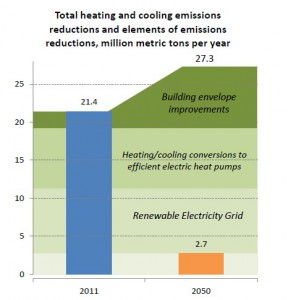This report is part of a larger project, Renewable Maryland, that aims to create a roadmap for an emissions-free, resilient, just, and economical energy system.
Space heating and cooling accounted for well over one-fourth of Maryland’s primary energy use in 2011 and more than 21 million metric tons of CO2 emissions. Achieving a nearly emissions-free energy sector in Maryland by 2050 will mean converting the vast majority of fossil fuel space heating systems to highly efficient electric heating systems (like cold climate heat pumps and geothermal heat pumps). This report assesses present space conditioning costs and the costs of a transition to a space heating and cooling sector that is “renewable-grid-ready.” In other words by converting to electricity, HVAC systems can be run on renewable electricity and emissions will decline as the proportion of renewable energy on the grid increases. The conversion from natural gas to efficient electric systems will be most complex because natural gas cost is low compared to other fuels like oil and propane. The upfront costs of efficient electric systems is also an issue. The report examines policies to make the conversion more feasible. It also analyzes the implications for long-term natural gas demand if a transition to electric space heating systems is made.
Download the complete report [1.6 MB, PDF]